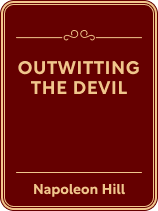

This article is an excerpt from the Shortform book guide to "Outwitting the Devil" by Napoleon Hill. Shortform has the world's best summaries and analyses of books you should be reading.
Like this article? Sign up for a free trial here .
Are you stuck in a cycle of negative thoughts and behaviors? Are you ready to break out of that cycle?
In his book Outwitting the Devil, Napoleon Hill explains that we get set in certain behavior patterns. You can break out of a negative pattern and establish a new, positive one. He recommends three steps: set a life goal, choose faith over fear, and never accept less than you deserve. The overarching principle of these steps is to be confident and committed in everything you do.
Read more for Hill’s discussion of how to change your behavior.
Changing Your Behavior
Any indifferent person can become an independent thinker, but the longer you’ve been caught in the cycle of indifference, the harder it will be to break your old patterns and commit to the hard work that success requires. The same actions, beliefs, and thoughts, repeated over and over, become a kind of rhythm or pattern that, like a current, is easier to flow with than to swim out of.
This is what Hill calls a pattern of behavior. Nature is given to cycles or patterns, with the same processes repeating every season, every day, or every second. Humans are aspects of nature and therefore subject to the same laws. That said, he stresses that if you recognize that you’re caught in this pattern of indifferent behavior, you can break yourself out of it, and you can even turn this aspect of nature to your advantage by establishing a new pattern.
Hill argues that positive actions or thoughts, repeated over and over, will become easier and easier, and will attract greater rewards. While there is always a risk of slipping back into old habits, a long-term commitment to independent thought and pursuing your goals will strengthen you against the devil’s influence.
| Setting Patterns It’s an established belief among scientific experts that practice and repetition, rather than inborn skill, is the key to success. In The Willpower Instinct, psychology professor Kelly McGonigal argues that developing good habits by establishing a routine and rewarding yourself for following it is a more reliable source of personal change than relying on willpower or self-control, which can be shaken by bad circumstances or failure. Hill’s ideas have also been adapted by the modern self-help movement in the form of habit- or routine-setting. In Atomic Habits, writer and entrepreneur James Clear suggests recognizing the behaviors you repeat daily and adjusting them to be more positive, or to link rewards you give yourself (such as having a beer after dinner) with tasks you want to turn into habits (after dinner, you write for an hour, and only then have the beer). In his view, these habits will compound over time, not only becoming easier to do, but also encouraging you to pick up more good habits and discard more bad ones. |
Want to learn how to change your behavior? Hill offers several steps to start you on this process:
Step 1: Set a Goal for Your Life
Hill advises that to start creating positive habits, you’ll need to set a specific goal for your life, make a plan to achieve it, and be prepared to sacrifice anything for it. Be prepared to work hard and to give as much as you get, since Hill warns that no lasting success can be achieved without effort.
| How to Set a Goal Finding a goal around which to base your entire life is easier said than done. Though Hill’s focus is on professional or financial goals, your goal can be more personally or spiritually motivated. A good starting point is to ask yourself what makes you happiest—is it your family? Your job, or a job you dream of having? A hobby or sport? Being in a particular place? What are your dreams, and how can you, as much as possible, prioritize the things that make you happy? In The Subtle Art of Not Giving a F*ck, motivational author Mark Manson argues that most of our struggles and frustrations come from having been misled by parents, friends, and social media to focus on the wrong things, rather than on what makes us happy. On his website, he poses seven questions designed to help you set a goal in the most stress-free way possible, beginning with “What’s your favorite flavor of shit sandwich?” Like Hill, Manson emphasizes the need for sacrifice, noting that one way to find your passion is to identify the thing that you are most willing to suffer for. If you’re willing to sacrifice for something, even when you’re not supported by the people around you and even when it doesn’t produce immediate rewards, that may be your goal or a step towards it. |
Step 2: Choose Faith Over Fear
Hill encourages you to remain confident that your goal can be achieved, no matter how long it takes. Don’t let fear of failure or its consequences discourage you, and have faith both in yourself and in a higher power, be it God or the universe more generally. If you pray, you should be clear about what you want and what you’re willing to sacrifice to get it—avoid begging or praying only when you’re desperate since this removes your own agency and is a more negative-minded approach to achieving your goals. Hill argues that only a positive approach to your relationship with God will yield positive results.
| Choosing Faith and Norman Vincent Peale Norman Vincent Peale, a pastor and a contemporary of Hill who knew him through their mutual publisher W. Clement Stone, wrote on “choosing faith” in a way similar to Hill in his 1952 book The Power of Positive Thinking. While Peale is a controversial figure today, both for his connections to the New Thought movement and his personal relationship with Donald Trump, his book was a bestseller. Like Hill, he argued that our attitudes and thoughts give us the power to overcome any obstacle, no matter how serious. For Peale, positive thinking and positive prayer go hand-in-hand. He described prayer as a manifestation of energy and emphasized the importance of placing absolute faith in yourself and in God to achieve positive results. Of the ten steps that he recommended readers practice daily, over half involved positive visualizations or repeating phrases that affirm your trust in God. Though Peale’s approach is more explicitly Christian in its goals, he and Hill agree on the power of the mind and of faith to change your life. |
Step 3: Never Accept Less Than What You Deserve
Connected to the idea of choosing faith, Hill repeatedly stresses that you should never give up or compromise on your goals, no matter what setbacks or failures you experience. Life is short, so you should value your time and refuse to settle for anything but achieving exactly what you want.
(Shortform note: “Never compromise” may seem like poor advice, but Hill’s point is not that we should refuse to work with others and meet their needs, but that we should refuse to accept failure, even when it comes in the form of a proposed alternative or watered-down version of our goal. Many modern self-help writers, writing in Hill’s tradition, agree: Never settle. If your dream is to work as an artist full-time, you shouldn’t accept the offer of a high-paying job that’s in the same field but nothing like what you really want to do. Part of having faith is knowing that these supposedly “more realistic” alternatives won’t make you happy and that your true goal is worth holding out for.)

———End of Preview———
Like what you just read? Read the rest of the world's best book summary and analysis of Napoleon Hill's "Outwitting the Devil" at Shortform .
Here's what you'll find in our full Outwitting the Devil summary :
- How failure and bad habits keep people from reaching their potential
- How to escape the Devil’s influence and avoid being turned toward inaction
- How to find your way to professional and financial success






